Guest Post: Jamie Sandford from HomeFlooringPros is here to discuss how much it costs to install hardwood flooring!
Year after year, hardwood flooring continues to be the most desirable flooring option amongst homeowners in the US. Outstanding beauty, longevity, and easy cleaning are just a few of the reasons wood floors remain so popular. However, popularity comes at a price and before you start to dream of new hardwood floors you will, no doubt, want to know how much all this will cost.
Of course, the final cost to install hardwood will vary from home to home, but you can typically expect to pay between $2,620 and $6,450, for the flooring, supplies, and labor.
That’s the typical range for 500 square feet of hardwood flooring installed. That hardwood flooring cost per square foot works out to about $5.25 to $13.00. Because the price range is so wide, we should discuss the factors that will determine what your final installed hardwood flooring price will be. Then we’ll look at ways to cut costs, without settling for less, plus the importance of hiring an experienced hardwood flooring installer.
Related Content > What is Engineered Hardwood?
Installation Cost Factors
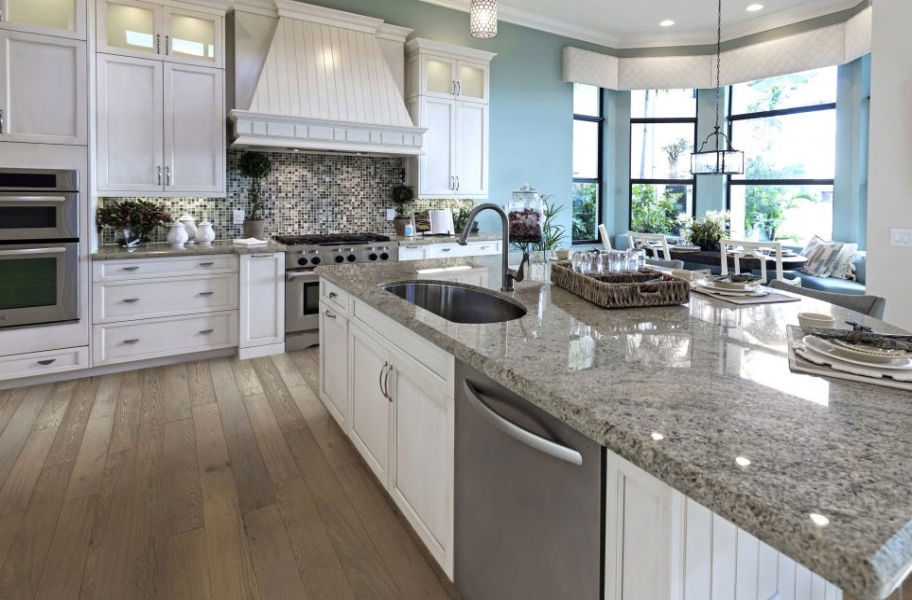
The cost to install hardwood flooring will vary depending on:
Species of Wood
Domestic hardwoods like White Oak, Red Oak, Maple, Birch, Beech, and Hickory cost the least. Less common domestic woods including Walnut, Cherry, and Ash cost a little more. Imported/Exotic hardwood flooring is the most expensive. Popular exotic varieties are Teak, Mahogany, Tigerwood, Jatoba, and a long list of others.
Flooring Type
Solid wood planks and engineered hardwood planks are the options. Solid hardwood flooring is just what it says – one piece of wood. Engineered hardwood has a solid hardwood top layer. But the lower layers are crossed plywood strips made from cheaper woods.
What’s the difference? Solid hardwood costs a little more, but it can be refinished multiple times and has a lifespan of 100+ years vs. 35-50 for engineered flooring. The benefit of engineered hardwood flooring is that it handles moisture better. That means it can be used in the bathroom or kitchen and humid basements. Installation requirements vary, so check the manufacturer’s guidelines.
Complexity of the Installation
Experienced installers are adept at eyeballing the job and knowing how long it will take. That determines the installation labor part of the equation. Factors that take more time, and so raise the cost, include lots of cuts and trims per the area covered (think bathrooms, and of course kitchens with lots of cabinets, an island, walk-in pantry, etc.), installing planks diagonally, and laying custom borders. The last factor about borders is also called “picture framing” the floor and is becoming more popular mostly in high-end installations.
Stairs
Installing hardwood on stairs is usually estimated separately at up to $200 per stair – possibly higher. It is time-consuming work.
Finish
Your options start with affordable water-based and oil-based polyurethane that is DIY-friendly and easy to refinish. An acid-cured finish is a pricey professional-only option but ideal for exotic woods with rich graining and for parquet flooring. Penetrating oil is another expensive finish, but very durable and ideal for high-traffic floors. Aluminum oxide is a mid-priced finish that is tough as nails. It’s only available on factory-finished hardwood planks – but keep in mind it is so hard that it makes refinishing the floors difficult.
Removal of Existing Floor Material
Cost varies a lot. Carpet is easy to pull up, so removal cost is $1.00 to $1.50 per square foot. Glue-down flooring and ceramic/stone tile are not, and you’re looking at $2.00-$4.00 per square foot. In fact, when flooring is glued to a wood subfloor, the subfloor is removed and replaced at a cost of $2.75 to $4.00 per square foot.
Condition of Your Subfloor
The best-case scenario is that it’s in good condition with maybe the need to pull a few carpet tacks or fill a couple of gouges before installing wood flooring. The cost increases if self-leveling concrete is needed to fix low spots in concrete or, as mentioned, a wood subfloor must be replaced.
Related Content > Wood Flooring Trends
Cost Breakdown
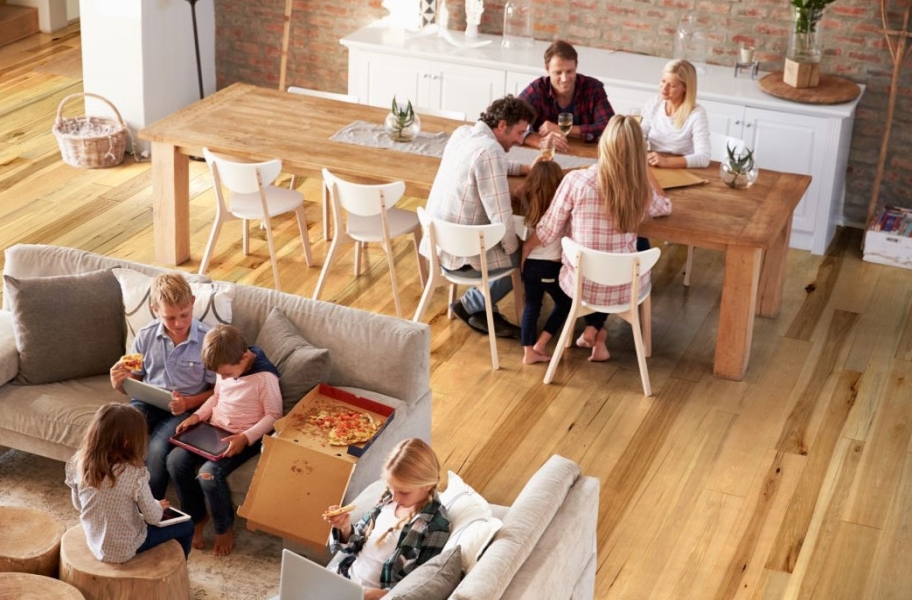
Cost to install a hardwood floor will normally include:
Materials
Common, readily available domestic woods start at about $5.00 per square foot. Rarer woods, especially imports, cost closer to $12.00 and sometimes more. Besides the wood species, finish affects cost, as do any special treatments such as a handscraped or wire-brushed finish or wood that has been smoked or fumed to enrich the appearance. Remember to factor in the potential cost of subflooring.
Supplies
The flooring contractor will supply equipment and supplies such as a level, staple gun, fasteners, and adhesive, as well as protective gear. Find out whether the finishing treatment, trims, and molding are included.
Labor
Besides theinstallation cost to install a hardwood floor, your contractor might repair or replace the subfloor and add an insulating underlay. Moving furniture out of the room may be an additional expense.
Cleanup
Removal and disposal of one or more layers of existing flooring is usually charged by the square foot, depending on the material. If you are unlucky and discover old asbestos tiling or lead paint, you will need to add in the expense of having it safely removed.
Related Content > Best Engineered Wood Flooring Options
Get the Most for Your Money
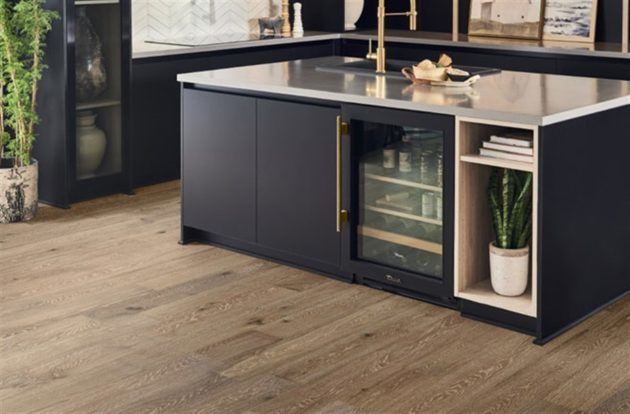
Avoid warped floorboards in your future. Allow several days after delivery for your flooring to acclimate to the relative humidity inside your home. Use a hygrometer to measure and compare humidity levels.
Save money by removing the old floor yourself … if there is only one layer and no lead paint or asbestos to worry about. Flooring removal can be hard work, but it’s not technically difficult.
Save on the purchase of new hardwood flooring by shopping online and by looking for closeout sales. (Be sure to order extra to cover future repairs.) Pick up the material yourself, if possible, and forego delivery charges.
Stain and seal the floor post-installation rather than shelling out for pricy prefinished hardwood flooring. Just make sure you know what you’re doing to avoid costly mistakes like bubbles in the finish, visible applicator strokes or lap lines, or an uneven sheen caused by thickness differences in the sealer. Watching a few tutorials will provide knowledge about finishing products, applicators, and techniques.
If money is really tight, install hardwood only on the main floor of your home. Use less expensive carpet for the upper stories. Wood-look laminate is another popular option that costs about the same as midgrade carpeting.
Related Content > Engineered Hardwood Flooring FAQs
How Much Hardwood Flooring Do I Need?
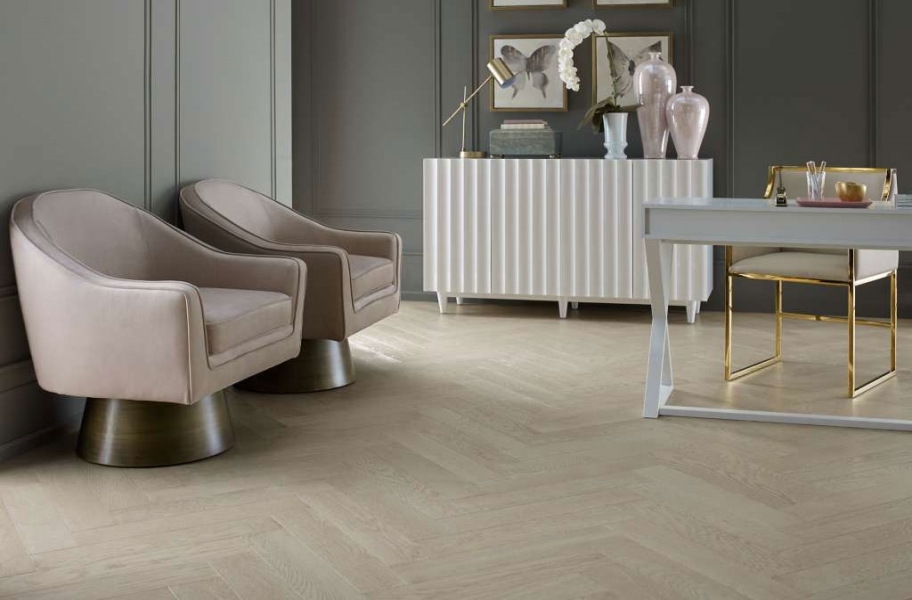
The general rule of thumb is to order 5% to 10% more flooring than required. This covers what is lost through trimming or the occasional mis-cut piece.
If you end up with several cartons of flooring left over, keep one for repairs. The rest can be returned if they haven’t been opened. We say if because several cartons should be opened at the same time, and planks from the three or four boxes mixed. Manufacturers make hardwood in “runs,” and if you get cartons from two or more batches, there will be slight color variations. Failing to mix the planks could result in visible shade differences in the floor.
Hire a Proven Professional
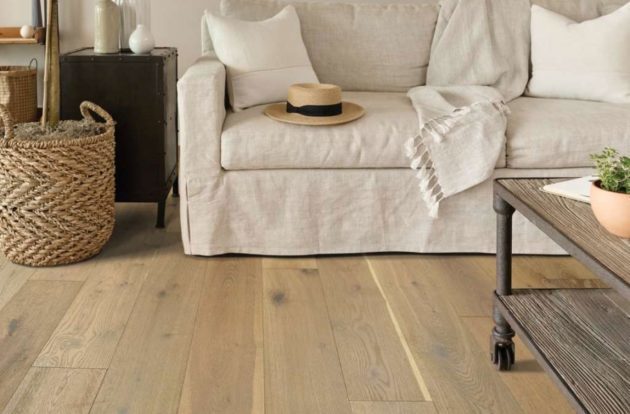
That’s just one reason to hire an installer with a proven track record. Experienced installers are adept at ordering the right amount – and if they order too much, not ending up with two or more opened boxes of flooring.
Additionally, their skill in laying out the floor, proper installation, and a “perfect” finish will come together in the gorgeous hardwood floor you expect.
Conclusion
Now you have more insight into hardwood flooring cost! Are you ready to start shopping?
Order Free Samples Shop All Engineered Hardwood
The post How Much Does It Cost to Install Hardwood Flooring? appeared first on Flooring Inc.